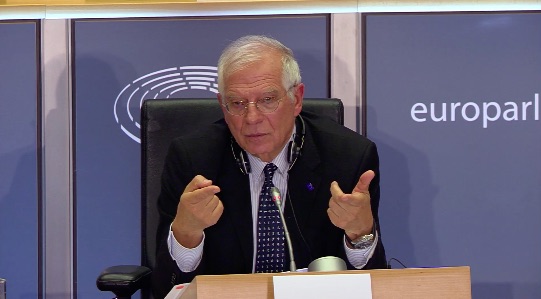Good afternoon everybody.
It has been a long and intense Foreign Affairs Council. Let me focus on the two main issues, which reflect our strategic priorities: the Western Balkans on one side and the relations with the United States on the other.
There were a number of other current issues, let me cite among them Palestine, let me start with it. Our initial focus was on the situation with regard to the postponed Palestinian elections, but we also discussed about the serious situation on the ground.
Today – which is, by the way, Jerusalem Day – is a very sensitive moment. We are deeply concerned over the recent clashes and violence, including again this morning in and around the Haram al-Sharif/Temple Mount.
It is clear that all sides must uphold and fully respect the status quo of the holy sites. And all leaders have a responsibility to act against extremists. But I have to recall what we have been saying during the weekend. The situation with regard to the evictions of Palestinian families in Sheikh Jarrah and other areas of East Jerusalem is a matter of serious concern. I want to repeat what we have already been saying: Such actions are illegal under international humanitarian law and only serve to fuel tensions on the ground. It is important that everything possible will be done to avoid fuelling tensions. And we note that the decision to stop Jewish worshippers from accessing the esplanade is a positive one that can calm the situation.
On Western Balkans, it has been a long discussion. The region has a special role in Europe and for Europe. We agreed that the Western Balkans is a region of key geostrategic role for the European Union. Our commitment to the Western Balkans needs to be very visible and we should leave no doubt in this respect.
And the message that the Ministers [of Foreign Affairs of the European Union] sent today was very clear. They reaffirmed the European perspective of the whole region. But this is not only about the enlargement process. We want to ensure that we have a political engagement with our partners. From addressing the COVID-19 pandemic and vaccines, economic cooperation, connectivity, how to tackle external influence, reduce disinformation, just to name a few issues.
During our discussions there was a wide agreement on the need for the Western Balkans to accelerate European Union-related reforms and reinforce positive and constructive narratives. We need to advance on the accession process of Albania and North Macedonia. And by the way, there has never been any intention of decoupling both countries in the accession process.
EU integration with Serbia and Montenegro needs to be taken forward. We need progress on visa liberalisation for Kosovo, we ask it to the Member States. There was also a clear expectation for the swift resumption of the Belgrade-Pristina Dialogue that, as you know, will re-start before the end of June, as we agreed with the Prime Minister of Kosovo [Albin Kurti] recently.
We recalled continued and strong support for Bosnia and Herzegovina’s territorial integrity and sovereignty, I have to repeat it once again. The Ministers agreed on the need for Bosnia and Herzegovina to use this year to advance constitutional and electoral reform. We need to continue supporting these efforts through a daily engagement of our Special Representative in Sarajevo [Johann Sattler].
We also agreed to look at ways to enhance our already intense cooperation on security and global issues. Let me stress that our help to fight against the coronavirus pandemic comes with no strings attached. We talk about donations, we are not selling, we are donating, and these donations come on top of our global substantial contribution to COVAX and we do not put conditions to the States that receive this help.
The second big item in our agenda was transatlantic relations. I will repeat once again that with the new administration we have excellent and operational relations.
We have already made progress together on some important issues, such as reengaging the US on the JCPOA [Joint Comprehensive Plan of Action, the Iran nuclear deal], relaunching the Dialogue on China, suspending temporarily tariffs under the Airbus/Boeing dispute, or liaising on responses to developments in Russia and Myanmar.
This renewed partnership between the European Union and the United States is based on more engagement, more coordination and cooperation. And it is already happening, as has been demonstrated today in the exchange of views with the US Special Presidential Envoy on Climate, John Kerry.
All Member States participated in the exchange of views, together with the [Executive] Vice-President [of the European Commission] Frans Timmermans, about how to increase global climate ambition, especially among the world’s biggest economies; how to keep our promises; how to lead by example; and how to motivate others to do more.
We agreed to work systematically together to set new borders, new frontiers in climate ambition and scale-up efforts to prompt partners to deliver the best possible commitments under the Paris Agreement. We will do that bilaterally and multilaterally – in the G7 and the G20 meetings, with the hope that we can push [for] progress with all big emitters.
Turning to the current issues that kept us busy today, we once again expressed our solidarity with the Czech Republic and Bulgaria in light of the recent events related to Russia.
I have to repeat again that the pattern of negative actions by the Russian Government continues and it feeds the dynamic of escalation. Today’s exchange will feed into the European Council discussion on European Union-Russia relations on the next 25th May.
Allow me some words about the JCPOA. I have been briefing my colleagues about the [ongoing] negotiations – you know that the High Representative is also the Coordinator of the JCPOA – this remains an extremely delicate and intense diplomatic process. I dare to say that I am optimistic, there is a window of opportunity that will stay open for a couple of weeks until the end of the month but a lot of work is needed, time is limited and I hope that the negotiations will enter in a phase of non-stop negotiation in Vienna.
We also talked about global health, vaccination, we had a look at the situation, how the European Union is delivering. It is important to notice that the European Union has exported almost 200 million doses – precisely 192 million doses, and at the same time is vaccinating its own population. This export effort is considerably bigger than China with 147 million and Russia with only 10 million, and the US and United Kingdom almost zero.
We will continue to play our role in leading the multilateral response through COVAX.
Two more issues that have been in the agenda and are things that worry us: Lebanon and Belarus.
In Lebanon the situation continues deteriorating, the country is collapsing, its people are suffering. But the political leaders are not taking responsibility while the country is literally falling apart. I had a conversation to prepare this meeting yesterday with the Foreign Affairs Minister of Lebanon [Charbel Wehbe], I expressed my concern, and we are working on an approach that combines let‘s say ‘carrots and sticks’.
All options are being examined, and the purpose is to pressure the Lebanese leaders individually that are preventing the country from overcoming the dramatic impasse it is facing. The [Lebanese] Minister explained to me the difficulties they are facing, inviting me to visit Lebanon and to have a conversation about these difficulties and the ways to overcome them. The work will continue, because we believe that much more can be done, and quickly.
And in Belarus the regime continues its repression and intimidation against their own citizens. Now, they are targeting the Polish community. We are working on the next sanctions package, which I hope will be adopted in the coming weeks. This will be another sanctions package, taking into account everything that is happening in the country, including the way the regime is targeting the Polish community.
Well I think this is a brief outline of the main points of a Council that started at 9 o’clock and lasted until almost 16:30. But I think it was interesting and fruitful and I remain at your disposal.
(eeas.europa.eu, 10/05/2021)












